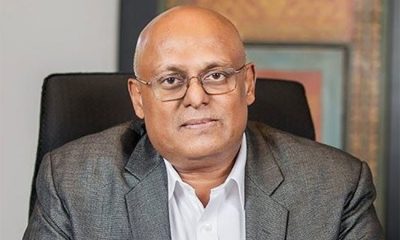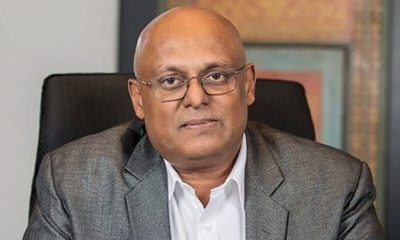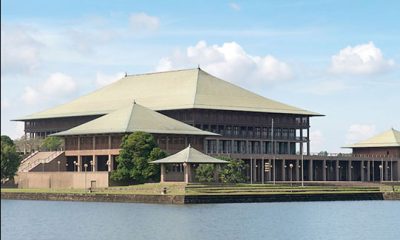Business
Human capital and natural resources are the real assets of Sri Lanka, not its SOEs: Suresh Shah

-
Dividends paid to government by SOEs including State Banks is a mere 0.5% of state revenue
-
Privatisation is a sensitive call undertaken in the interest of 22 million people
-
Restructuring crucial public entities more difficult than privatising SOEs
-
Finalising transaction advisors for entities identified for privatisation underway
-
Says government monopolies will not be converted into private sector monopolies
By Sanath Nanayakkare
Suresh Shah, Head of State Owned Enterprises (SOE) Restructuring Unit of the Ministry of Finance said last week that Sri Lanka’s true national assets are in its human capital and natural resources, so it needs to be correctly understood that state-owned enterprises are not the real national assets.
He made this remark while addressing a webinar on “Charting a New Course: Expert Perspectives on Restructuring State-Owned Enterprises” – which had been organised by the Centre for Banking Studies of the Central Bank of Sri Lanka.
His keynote speech also made the revelation that despite the fact some government entities are profitable, figures show that as an average over the past 10 years, the total dividend payout made to the government by all profitable SOEs including the State Banks had been a mere 0.5% of the total revenue of the government.
“None of these SOEs are national assets. National assets are elsewhere. Our true national assets are in our human capital, youth talent and natural capital such as rivers, forests and our ocean. We need to harness the potential of those national assets if we are to build the country we want,” he noted.
Further speaking he said:
“SOE restructuring goes much beyond privatising than many people would think. The real objective of the restructuring process is to provide improved products and services to the citizens of the country at the right price when and where they want them. SOE restructuring is all about enabling those elements within a competitive economic framework than at any given time. In other words, it is about providing the citizens with quality products and services at better prices with widespread availability. In this process, there will be some institutions that will be privatized and there will be some that will remain within government. The fundamental question in this context is how we are going to carry out this sensitive call.
The exercise will be about how the end-consumer would benefit as a result of it. Would the consumer be better served by privatizing a certain SOE or would it be better to leave it unchanged from government control? How does one make the decision? Many people talk about profit-making entities and loss-making entities but that’s not the way in which this decision should be made. The real decision should be made on whether there is a market failure or not. A market failure happens when goods and services are provided to consumers, but the provision of those goods and services don’t actually take place in a competitive environment favourable to the consumer.
It could be that there is a monopoly supplier at play or there are a few cohorts because of whom consumers don’t receive a fair and decent deal in terms of quality, price and availability. Ideally the government needs to look at the regulatory framework to ensure that citizens have unhindered access to essential services they need rather than non-essential goods and services. The government doesn’t necessarily have to be in business to deal with market failure because it can do so with regulatory mechanisms and thus ensure proper operation in the market and safeguard the consumer.”
“The opinion that is doing the round is; loss-making SOEs need to be privatised and profit-making SOEs need to remain unchanged in government control. This is a fallacy surrounded by misinformation. Something that a lot of people tend to forget is that the profit an SOE makes doesn’t belong to the shareholder, in this case the government. What come to the shareholder are the dividends and not the profits. The profits remain within that company. So if a 100% government-owned entity makes a profit of Rs. one billion and declares a dividend of Rs. 100 million, the Rs. 900 million will remain with that entity and the government would get only Rs. 100 million.
If you look at the past 10-years, the average of the dividends declared by all SOEs to the government, as a component of the government’s total revenue works out to about 0.5%. And this includes the dividends that have been declared by the State Banks as well. So what the government gets in cash flow terms from profit-making SOEs is a very, very small component of its total revenue.”
” If we divest a listed government entity at the market price (without a premium) and you invest the proceeds of that in fixed deposits, the chances are that fixed deposit interest you will earn from those proceeds would be about 4 to 5 times the dividends that entity would declare in any given year. So if you look at it from a purely cash flow terms, it makes sense to divest these entities”.
“Another point to remember is the government collects taxes from private and public entities; 15% of a company’s revenue as VAT, 2.5% as social security levy and 30% on its profit as income tax comes to the government. In addition, a public sector entity will provide the government with dividends. When you move these entities into the private sector, they will increase their productivity and efficiency. What you lose from the dividend component, you will be more than compensated through taxation. So from a purely cash flow point of view, this story about profit-making entities and loss-making entities simply doesn’t hold water. And the biggest danger in making the case for profit -making enterprises and loss-making enterprises is that we are pushing the government to focus on profit.
When that happens it tends to ignore its fundamental responsibility of providing services to the citizens. You can’t have a profitable police department or national education system or healthcare system. So, getting the government to focus on profit is extremely dangerous because it has it obligations to the general public. Profit should be the purview of the private sector. This is why we need to move certain SOEs to the private sector and retain critical public services in government control. When non-critical SOEs are privatised, the government will have the taxation system at its disposal to raise enough revenue to provide critical public services on its own account.”
“We need to have a proper system to manage those entities unchanged from the government control. This will be more difficult than privatizing other SOEs.”
“SOEs have failed mainly because we have parked the losses that came from politically-driven subsidies within these SOEs. Such subsidies must be taken on the government’s balance sheet rather than the balance sheet of the entity through which the subsidies are provided. Cases in point are the CEB and CPC where subsidies were given on electricity and fuel respectively. As a result of that, those entities had poor balance sheets and when it came to a crunch, we faced fuel shortages and power cuts. And very recently we had dramatic increases in energy prices.
So we need to have a system where we don’t park subsidies within these entities. SOEs have also failed because of poor management system. We need to appoint fit and proper people to their boards. And also we created jobs in SOEs that were not really there and made them overstaffed. Further, government management procedures are cumbersome, unproductive and take a long time whereas the private sector can make decisions more much more efficiently than the government. The restructuring process will carefully take all these into account in order to make SOEs commercially-oriented ventures.”
Suresh Shah emphasized that he is aware that his unit is dealing with the interests of 22 million people who are stakeholders of these entities and he and his team would do the job in a very responsible and transparent manner.
“At present we are shortlisting or trying to finalize transaction advisors for entities that have been identified for privatization. Once that is done, once the advisors are appointed then they will help us with the due diligence and with valuations. They will help us create data rooms for review of potential investors. And then we will open up the EOI and RFP process once again to invite bids from anyone who is interested in making a proposal for any one of these entities.”
He asserted that his unit would try its best to ensure that in the process of restructuring, government monopolies would not be turned into private sector monopolies.
Manjula de Silva, Former Secretary General and CEO of the Ceylon Chamber of Commerce said,” Privatization is not the only option. In some cases, you would want to keep the state entities going but open the market for other players by liberalizing it. I think that is what is happening in the petroleum distribution sector. What is important is creating a level playing field for everyone. For example, the Petroleum Ministry is setting policy for the petroleum industry while operating CPC. So we need to separate policy making, regulating and commercial operations to ensure that the market environment is fair for everyone.”
Prof. Rohan Samarajiva, Chairperson of LIRNEasia who has been a longtime proponent of SOE restructuring and privatization said,” I have been advocating this for many years on my own account for my own purposes. For one thing, I want a better country for my grandchildren to live in. So, getting the entire purpose of this privatization exercise effectively communicated to the general public is vital. We have got to let the people know that by doing this good things can happen for the benefit of every one. A case in point is Lanka Hospitals Plc. Who would have thought the government would get into the health sector as a private player? It just happened because Lanka Hospitals fell in the lap of the government accidentally. If we can spread the success story of that chance-happening and its positive results across the society, I think that would be a wonderful start in our communication journey.”
Dhananath Fernando, Chief Executive Officer of Advocata Institute moderated the webinar.
Business
AHK Sri Lanka champions first-ever Sri Lankan delegation at Drupa 2024

The Delegation of German Industry and Commerce in Sri Lanka (AHK Sri Lanka) proudly facilitated the first-ever Sri Lankan delegation’s participation at Drupa 2024, the world’s largest trade fair for the printing industry and technology. Held after an eight-year hiatus, Drupa 2024 was a landmark event, marking significant advancements and opportunities in the global printing industry.
AHK Sri Lanka played a pivotal role in organising and supporting the delegation, which comprised 17 members from the Sri Lanka Association for Printers (SLAP), representing eight companies from the commercial, newspaper, stationery printing, and packaging industries. This pioneering effort by AHK Sri Lanka not only showcased the diverse capabilities of Sri Lanka’s printing sector but also facilitated vital bilateral discussions with key stakeholders from the German printing industry.
Business
Unveiling Ayugiri: Browns Hotels & Resorts sets the stage for a new era in luxury Ayurveda Wellness

In a captivating reimagining of luxury wellness tourism, Browns Hotels & Resorts proudly unveiled the exquisite Ayugiri Ayurveda Wellness Resort Sigiriya. This momentous occasion, celebrated amidst a vibrant and serene grand opening on the 6th of June, heralds a new chapter in the Ayurveda wellness tourism landscape in Sri Lanka. Nestled amidst 54 acres of unspoiled natural splendour, Ayugiri features 22 exclusive suites and stands out as the only luxury Ayurveda wellness resort in the country offering plunge pools in every room, rendering it truly one-of-a-kind.
The grand opening of Ayugiri Ayurveda Wellness Resort was an enchanting event, where guests were captivated by the melodies of flutists and violinists resonating through Sigiriya’s lush landscapes. As traditional drummers and dancers infused the air with vibrant energy, Browns Hotels & Resorts’ CEO, Eksath Wijeratne, Kotaro Katsuki, Acting Ambassador for the Embassy of Japan and General Manager, Buwaneka Bandara, unveiled the resort’s new logo, marking a significant moment witnessed by distinguished guests from the French Embassy, Ayurveda and wellness enthusiasts along with officials from the Sigiriya area, LOLC Holdings and Browns Group.
“Our strategic expansion into wellness tourism with Ayugiri Ayurveda Wellness Resort Sigiriya symbolises a significant milestone for Browns Hotels & Resorts. Wellness tourism has consistently outperformed the overall tourism industry for over a decade, reflecting a growing global interest in travel that goes beyond leisure to offer rejuvenation and holistic well-being. By integrating the timeless wisdom of Ayurveda with modern luxury, we aim to set a new standard in luxury wellness tourism in Sri Lanka. Whether your goal is prevention, healing, or a deeper connection to inner harmony, Ayugiri offers a sanctuary for holistic well-being” stated Eksath Wijeratne.
Ayugiri encapsulates the essence of life, inspired by the lotus flower held by the graceful queens of the infamous Sigiriya frescoes. Just as the lotus emerges from the murky depths, untainted and serene,
Ayugiri invites guests on a journey of purity and rejuvenation, harmonised with a balance of mind, body and spirit, the essence of nature, echoes of culture and the wisdom of ancient Ayurvedic healing.
Business
HNB General Insurance recognized as Best General Bancassurance Provider in Sri Lanka 2024

HNB General Insurance, one of Sri Lanka’s leading general insurance providers, has been honored as the Best General Bancassurance Provider in Sri Lanka 2024 by the prestigious Global Banking and Finance Review – UK.
The esteemed accolade underscores HNB General Insurance’s unwavering commitment to excellence and its outstanding performance in the field of bancassurance. Through dedication and hard work, the HNB General Insurance team has continuously endeavored to deliver innovative insurance solutions, cultivate strong relationships with banking partners, and provide unparalleled service to customers nationwide. This recognition is a testament to the team’s dedication and relentless pursuit of excellence in the bancassurance business.
“We are honored to receive this prestigious award, which reflects our team’s tireless efforts and dedication to delivering value-added insurance solutions and exceptional service through our bancassurance partnerships,” said Sithumina Jayasundara, CEO of HNB General Insurance. “This recognition reaffirms our position as a trusted insurance provider in Sri Lanka and motivates us to continue striving for excellence in serving our customers and communities.”






















